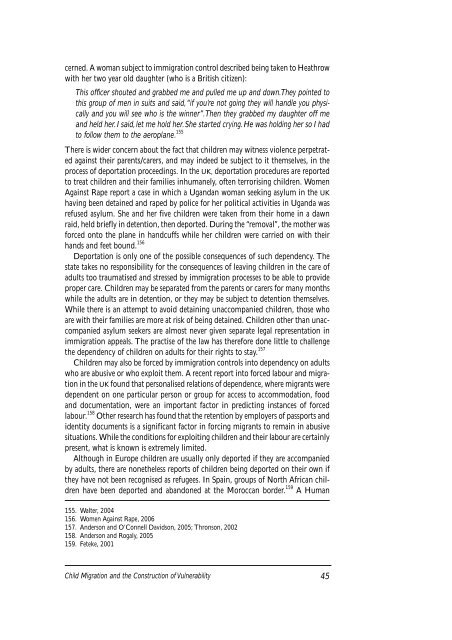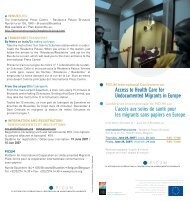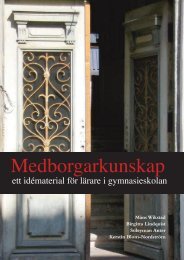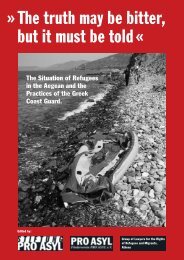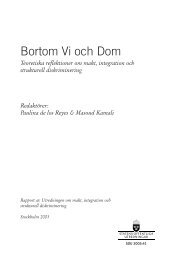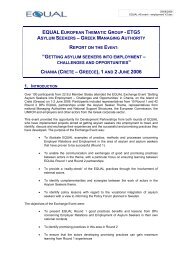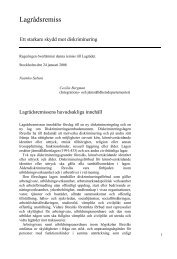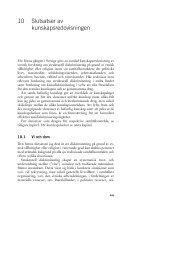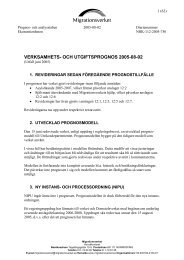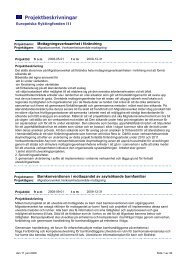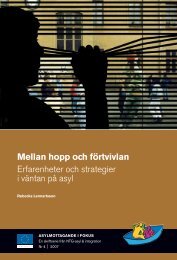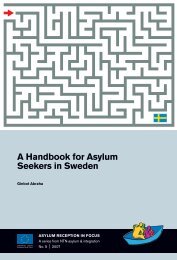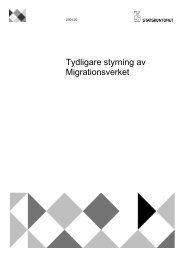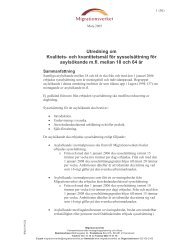and the Construction of Vulnerability - Child Trafficking
and the Construction of Vulnerability - Child Trafficking
and the Construction of Vulnerability - Child Trafficking
Create successful ePaper yourself
Turn your PDF publications into a flip-book with our unique Google optimized e-Paper software.
cerned. A woman subject to immigration control described being taken to Heathrow<br />
with her two year old daughter (who is a British citizen):<br />
This <strong>of</strong>ficer shouted <strong>and</strong> grabbed me <strong>and</strong> pulled me up <strong>and</strong> down.They pointed to<br />
this group <strong>of</strong> men in suits <strong>and</strong> said,“if you’re not going <strong>the</strong>y will h<strong>and</strong>le you physically<br />
<strong>and</strong> you will see who is <strong>the</strong> winner”.Then <strong>the</strong>y grabbed my daughter <strong>of</strong>f me<br />
<strong>and</strong> held her. I said, let me hold her. She started crying. He was holding her so I had<br />
to follow <strong>the</strong>m to <strong>the</strong> aeroplane. 155<br />
There is wider concern about <strong>the</strong> fact that children may witness violence perpetrated<br />
against <strong>the</strong>ir parents/carers, <strong>and</strong> may indeed be subject to it <strong>the</strong>mselves, in <strong>the</strong><br />
process <strong>of</strong> deportation proceedings. In <strong>the</strong> UK, deportation procedures are reported<br />
to treat children <strong>and</strong> <strong>the</strong>ir families inhumanely, <strong>of</strong>ten terrorising children. Women<br />
Against Rape report a case in which a Ug<strong>and</strong>an woman seeking asylum in <strong>the</strong> UK<br />
having been detained <strong>and</strong> raped by police for her political activities in Ug<strong>and</strong>a was<br />
refused asylum. She <strong>and</strong> her five children were taken from <strong>the</strong>ir home in a dawn<br />
raid, held briefly in detention, <strong>the</strong>n deported. During <strong>the</strong> “removal”, <strong>the</strong> mo<strong>the</strong>r was<br />
forced onto <strong>the</strong> plane in h<strong>and</strong>cuffs while her children were carried on with <strong>the</strong>ir<br />
h<strong>and</strong>s <strong>and</strong> feet bound. 156<br />
Deportation is only one <strong>of</strong> <strong>the</strong> possible consequences <strong>of</strong> such dependency. The<br />
state takes no responsibility for <strong>the</strong> consequences <strong>of</strong> leaving children in <strong>the</strong> care <strong>of</strong><br />
adults too traumatised <strong>and</strong> stressed by immigration processes to be able to provide<br />
proper care. <strong>Child</strong>ren may be separated from <strong>the</strong> parents or carers for many months<br />
while <strong>the</strong> adults are in detention, or <strong>the</strong>y may be subject to detention <strong>the</strong>mselves.<br />
While <strong>the</strong>re is an attempt to avoid detaining unaccompanied children, those who<br />
are with <strong>the</strong>ir families are more at risk <strong>of</strong> being detained. <strong>Child</strong>ren o<strong>the</strong>r than unaccompanied<br />
asylum seekers are almost never given separate legal representation in<br />
immigration appeals. The practise <strong>of</strong> <strong>the</strong> law has <strong>the</strong>refore done little to challenge<br />
<strong>the</strong> dependency <strong>of</strong> children on adults for <strong>the</strong>ir rights to stay. 157<br />
<strong>Child</strong>ren may also be forced by immigration controls into dependency on adults<br />
who are abusive or who exploit <strong>the</strong>m. A recent report into forced labour <strong>and</strong> migration<br />
in <strong>the</strong> UK found that personalised relations <strong>of</strong> dependence, where migrants were<br />
dependent on one particular person or group for access to accommodation, food<br />
<strong>and</strong> documentation, were an important factor in predicting instances <strong>of</strong> forced<br />
labour. 158 O<strong>the</strong>r research has found that <strong>the</strong> retention by employers <strong>of</strong> passports <strong>and</strong><br />
identity documents is a significant factor in forcing migrants to remain in abusive<br />
situations. While <strong>the</strong> conditions for exploiting children <strong>and</strong> <strong>the</strong>ir labour are certainly<br />
present, what is known is extremely limited.<br />
Although in Europe children are usually only deported if <strong>the</strong>y are accompanied<br />
by adults, <strong>the</strong>re are none<strong>the</strong>less reports <strong>of</strong> children being deported on <strong>the</strong>ir own if<br />
<strong>the</strong>y have not been recognised as refugees. In Spain, groups <strong>of</strong> North African children<br />
have been deported <strong>and</strong> ab<strong>and</strong>oned at <strong>the</strong> Moroccan border. 159 A Human<br />
155. Walter, 2004<br />
156. Women Against Rape, 2006<br />
157. Anderson <strong>and</strong> O’Connell Davidson, 2005; Thronson, 2002<br />
158. Anderson <strong>and</strong> Rogaly, 2005<br />
159. Feteke, 2001<br />
<strong>Child</strong> Migration <strong>and</strong> <strong>the</strong> <strong>Construction</strong> <strong>of</strong> <strong>Vulnerability</strong><br />
45


